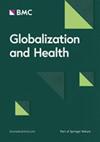哪些创建可持续粮食系统的政府政策有可能同时解决营养不良、肥胖和环境可持续性问题?
IF 4.5
2区 医学
Q1 PUBLIC, ENVIRONMENTAL & OCCUPATIONAL HEALTH
引用次数: 0
摘要
鉴于粮食系统对三个正在发生且相互关联的全球健康流行病的影响,迫切需要对粮食系统进行改造:(1) 营养不良和粮食不安全,(2) 肥胖和非传染性疾病 (NCD),以及 (3) 气候变化和生物多样性丧失。由于政策制定者的决策影响着粮食系统,本研究旨在确定具有双重或三重作用潜力的政策,并对其进行优先排序,以实现更健康、环境更可持续的粮食系统。本研究采用了四步方法论,包括:(i) 国际政策建议汇编;(ii) 在线调查;(iii) 与国际专家举行四次地区研讨会;(iv) 优先排序。根据政策的双重或三重责任潜力、协同作用和权衡,确定政策并排定优先次序。利用参与性和跨学科方法,如果政策被认为能有效解决以下两个或三个主要相关结果,则被确定为具有双重或三重责任潜力的政策:(1) 营养不良,(2) 肥胖/NCDs,(3) 环境退化。案头审查确定了 291 项对政府的建议,并将其合并和分类为 46 项初步建议的政策。根据在线调查的结果,61%的政策被认为具有双重或三重作用的潜力。在研讨会期间,确定了这些政策的 4 项潜在协同作用和 31 项权衡作用。为建立更健康、更环保、更可持续的食品系统而提出的 44 项拟议政策的最终清单被分为两大政策领域:"食品供应链 "和 "食品":食品供应链 "和 "食品环境"。权衡最多的结果是 "营养不良",其次是 "环境可持续性 "和 "肥胖/传染性疾病"。在专家排名前五位的粮食供应链政策中,有两项被认为具有三重责任潜力:(a) 激励作物多样化;(b) 支持初创企业和中小型企业。在食品环境方面,排名前五的政策中有三项被认为具有三重责任潜力:(a) 负担得起更健康、更可持续的饮食;(b) 为更健康、更可持续的食品提供补贴;(c) 限制儿童接触所有媒体的营销。本研究为创建更健康、更环保的可持续食品体系,确定了一份全面的双重和三重政府政策清单,并对其进行了优先排序。由于一些拟议的政策可能会在各种结果之间进行权衡,因此应根据具体情况谨慎制定、设计、实施和监测这些政策。本文章由计算机程序翻译,如有差异,请以英文原文为准。
Which government policies to create sustainable food systems have the potential to simultaneously address undernutrition, obesity and environmental sustainability?
A transformation of food systems is urgently needed, given their contribution to three ongoing and interlinked global health pandemics: (1) undernutrition and food insecurity, (2) obesity and non-communicable diseases (NCDs), and (3) climate change and biodiversity loss. As policymakers make decisions that shape food systems, this study aimed to identify and prioritise policies with double- or triple-duty potential to achieve healthier and more environmentally sustainable food systems. This study undertook a 4-step methodological approach, including (i) a compilation of international policy recommendations, (ii) an online survey, (iii) four regional workshops with international experts and (iv) a ranking for prioritisation. Policies were identified and prioritised based on their double- or triple-duty potential, synergies and trade-offs. Using participatory and transdisciplinary approaches, policies were identified to have double- or triple-duty potential if they were deemed effective in tackling two or three of the primary outcomes of interest: (1) undernutrition, (2) obesity/NCDs and (3) environmental degradation. The desk review identified 291 recommendations for governments, which were merged and classified into 46 initially proposed policies. Based on the results from the online survey, 61% of those policies were perceived to have double- or triple-duty potential. During the workshops, 4 potential synergies and 31 trade-offs of these policies were identified. The final list of 44 proposed policies for healthier and more environmentally sustainable food systems created was divided into two main policy domains: ‘food supply chains’ and ‘food environments’. The outcome with the most trade-offs identified was ‘undernutrition’, followed by ‘environmental sustainability’, and ‘obesity/NCDs’. Of the top five expert-ranked food supply chain policies, two were perceived to have triple-duty potential: (a) incentives for crop diversification; (b) support for start-ups, and small- and medium-sized enterprises. For food environments, three of the top five ranked policies had perceived triple-duty potential: (a) affordability of healthier and more sustainable diets; (b) subsidies for healthier and more sustainable foods; (c) restrictions on children's exposure to marketing through all media. This study identified and prioritised a comprehensive list of double- and triple-duty government policies for creating healthier and more environmentally sustainable food systems. As some proposed policies may have trade-offs across outcomes, they should be carefully contextualised, designed, implemented and monitored.
求助全文
通过发布文献求助,成功后即可免费获取论文全文。
去求助
来源期刊

Globalization and Health
PUBLIC, ENVIRONMENTAL & OCCUPATIONAL HEALTH-
CiteScore
18.40
自引率
1.90%
发文量
93
期刊介绍:
"Globalization and Health" is a pioneering transdisciplinary journal dedicated to situating public health and well-being within the dynamic forces of global development. The journal is committed to publishing high-quality, original research that explores the impact of globalization processes on global public health. This includes examining how globalization influences health systems and the social, economic, commercial, and political determinants of health.
The journal welcomes contributions from various disciplines, including policy, health systems, political economy, international relations, and community perspectives. While single-country studies are accepted, they must emphasize global/globalization mechanisms and their relevance to global-level policy discourse and decision-making.
 求助内容:
求助内容: 应助结果提醒方式:
应助结果提醒方式:


